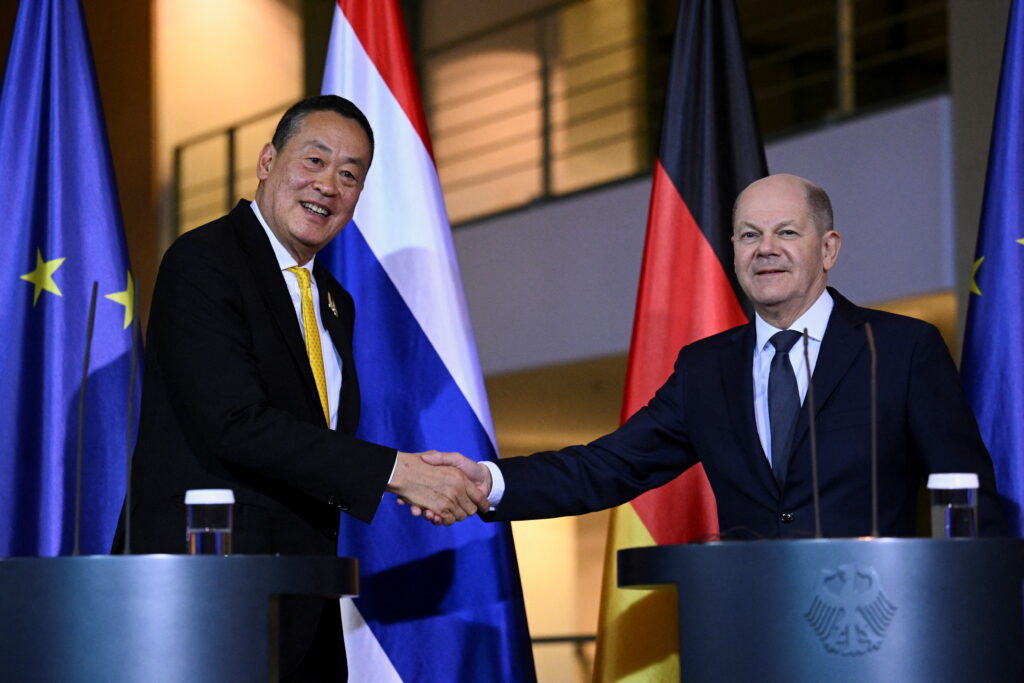As Thailand sets its sights on finalising a free trade agreement (FTA) with the European Union by 2025, how the European Union balances economic interests and democratic values in its dealings with Thailand remains to be seen.
Following the European Union’s decision to stop negotiations in response to the 2014 military coup, negotiations for an EU–Thai FTA resumed in 2023. Expecting negotiations to be completed by 2025, Thai Prime Minister Srettha Thavisin announced his government’s commitment to trade and investment to boost the economy.
During Srettha’s meetings with French President Emmanuel Macron and German Chancellor Olaf Scholz, ambitious plans were outlined aimed at positioning Thailand as a regional hub for aviation, transportation, tourism and the manufacturing of electric vehicles. Discussions also encompassed cooperation in clean energy, space innovation and fashion.
Thailand’s pursuit of a FTA with the European Union demonstrates its commitment to boosting trade and investments but lacks a concrete proposal and is reliant on the EU’s framework due to Thailand’s limited trade policy following the 2014 coup. Thailand views an agreement as crucial for increased market access, job creation and economic development.
The Thai government needs to address pressing domestic issues like the household debt crisis, wide income disparities and political instability to fully capitalise on the FTA’s benefits. Thailand should also navigate negotiation complexities, such as public procurement and intellectual property rights.
To ensure the EU–Thai FTA is effective, the European Union should prioritise strengthening trade partnerships with Southeast Asia by addressing trade barriers, safeguarding investments, promoting innovation and sustainability. It is also pertinent to scrutinise how the European Union, founded on principles of democracy and human rights, approaches negotiations with a country whose democratic credentials are questionable.
The European Union faces significant challenges reconciling economic interests with democratic values in negotiating with Thailand. Potential obstacles include divergent EU member states’ interests, Thailand’s sovereignty concerns and prioritising economics over democratic values. Domestic political issues, like the potential dissolution of the Move Forward Party heightens concerns about Thailand’s democracy. The European Union must uphold its liberal-democratic principles while engaging diplomatically, drawing on its experiences negotiating with ASEAN.
As the European Union seeks to leverage its economic influence to advocate for democratic reforms in Thailand, a viable strategy entails embedding specific FTA clauses pertaining to labour rights, environmental protection and good governance. These clauses will act as incentives for Thailand to uphold democratic principles.
Yet the challenges of harmonising free-trade with human rights principles, exemplified by agreements like the Comprehensive and Progressive Agreement for Trans-Pacific Partnership and the Canada-EU Comprehensive Economic and Trade Agreement, underscore the necessity for careful deliberation. Insights from case studies, such as the United States–Mexico–Canada Agreement, along with civil society perspectives emphasising fundamental rights, provide guidance. Comparative analysis of legal frameworks surrounding human rights provisions also offer crucial context. Policymakers must draw on historical precedents, academic insights and legal frameworks to ensure economic interests align with commitments to human rights.
For instance, labour rights clauses could include provisions protecting workers’ rights, such as the right to organise and bargain collectively and measures to prevent forced and child labour. Environmental protection clauses might address sustainable development, biodiversity conservation and climate change mitigation. Good governance clauses could encompass measures to promote transparency, anti-corruption efforts and mechanisms to resolve FTA-related disputes.
The clauses require careful negotiation and monitoring to ensure compliance by both parties. The European Union needs to balance economic interests with promoting democratic values and human rights. By integrating democratic principles into the FTA, the European Union can both commit to advancing democratic reform in Thailand while fostering mutually beneficial economic cooperation. The European Union should also use diplomatic channels to engage with Thai authorities on issues pertaining to political freedom, the rule of law and civil liberties.
Key chapters obstructing an agreement between the European Union and Thailand revolve around fisheries and aquaculture products. Challenges include rules of origin, illegal fishing, forced labour and sanitary standards. These demand provisions for sustainability and regulatory compliance, which may potentially complicate negotiations.
Thailand’s resistance to tackling its domestic monopolies further complicates matters, necessitating a commitment to substantial competition policy reforms for a successful agreement. Even if the European Union pushes certain values and Thailand agrees to them, Thai monopolies are unlikely to be included. The Thai government has not done its homework to convince big conglomerates to allow competition.
The European Union should also use its influence to support civil society organisations, human right advocates and independent media in Thailand. By advocating for their protection, the European Union can bolster Thailand’s democratic institutions. The European Union should also explore avenues to promote people-to-people exchanges and cultural diplomacy.
The FTA negotiations present an opportunity for the European Union to promote democratic values that support civil society actors and independent media in Thailand, alongside mutually beneficial trade benefits.
Prem Singh Gill is Visiting Scholar at the Faculty of Law, Universitas Muhammadiyah Yogyakarta, Indonesia, and Visiting Scholar in Thailand’s public universities.

